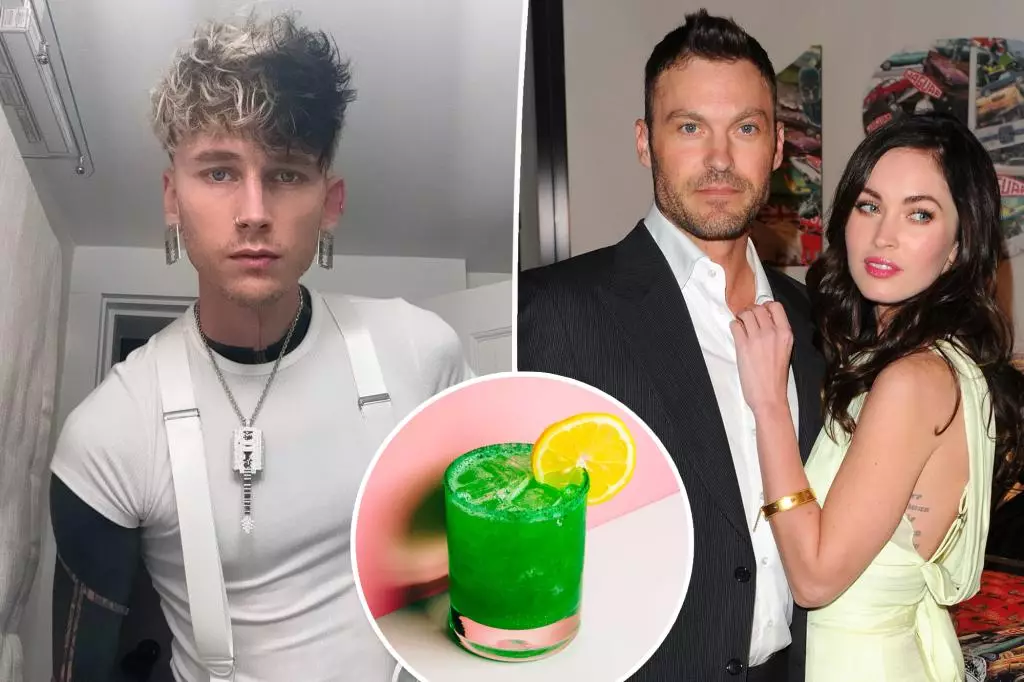In the chaotic world of celebrity relationships, drama often comes with a side of humor, particularly when it involves figures like Machine Gun Kelly (MGK) and Brian Austin Green. The latest chapter in their ongoing spat occurred when MGK took to Instagram to promote a new drink at his 27 Club Coffee lounge in Cleveland, Ohio, cleverly named the “Child Actor Margarita.” The drink features a vibrant, green concoction that not only caught the eyes of customers but also aimed its humor squarely at Green, best known for his role on the iconic series “Beverly Hills, 90210.”
The drink’s playful name and its description as a cocktail for those unwilling to embrace adulthood serve double duty: it showcases MGK’s comedic flair while indirectly poking fun at Green’s status as a once-celebrated teen idol. MGK’s choice of words is significant; it cleverly blurs the lines between youthful nostalgia and adult responsibility, illustrating a lighthearted yet pointed jab at Brian Austin Green’s career and current circumstances. The absence of Green’s name in the post does little to mask the dig, as celebrity feuds take on complex layers — they circulate back to the public’s ever-curious gaze, all while being wrapped in the glossy veneer of social media.
A Savage Message Reveals the Underlying Tensions
This playful mockery is rooted in deeper tensions that have been stirring beneath the surface. In a previous exchange, Green shared a message that MGK sent him regarding the impending birth of MGK and Megan Fox’s child. The communication turned savage quickly, as MGK rebuffed Green’s inquiry, labelling him a “child actor” and accusing him of being overly nosy about his personal affairs, invoking the metaphorical image of Green as an overzealous interloper. Such a statement carries weight, as it not only dismisses Green’s attempts at familial communication but also subtly reinforces his identity as a has-been in the ever-evolving landscape of Hollywood.
Green’s humorous retort — claiming that he underestimated the negativity associated with being labeled a “child actor” — only deepens the narrative of this rivalry. It’s a back-and-forth that feels less like a dispute and more like an ongoing skirmish where both parties are equally invested in maintaining their public personas, even if it means indulging in petty exchanges.
Social Media: The Grand Arena for Celebrity Conflicts
The fallout from these exchanges underscores the magnetic pull of social media as a stage for celebrity dramas. On platforms like Instagram and Twitter, what might once have been a private matter becomes public spectacle, encouraging not just interaction but also audience involvement in shaping perceptions. Social media outlets thrive on controversies, and both MGK and Green are adept at leveraging this to their advantage.
This conflict takes on additional layers when introduced to Green’s fiancée, Sharna Burgess, whose intervention in this squabble adds yet another voice to the chorus of reactions. Notably, she likened MGK’s actions to a territorial dog marking its area, simplifying the skirmish into a metaphor that everyone can relate to. Burgess emphasized the importance of creating positive experiences for children caught in the crossfire of parental disputes, creating a narrative that champions emotional well-being even amidst childish banter.
The Price of Public Scrutiny
However, one must consider the ramifications of such public spats. While they might serve as amusing fodder for the masses, they also illustrate the fragility of familial relationships in the spotlight. The very context of MGK and Green’s exchanges reflects the ongoing challenge of co-parenting in a world where every interaction can be scrutinized and dissected. The stakes in their feud may seem trivial to outsiders, yet they reveal a tangible tension that underscores the complexity of modern relationships, particularly in blended families.
The evolution of their feud doesn’t just reflect rivalry but hints at the pressure exerted by the media. As they navigate their struggles, what becomes clear is that such exchanges are rarely about the people involved but rather about how they are perceived by the audience. Every drink named, every message shared, becomes a chapter in a narrative that is continuously crafted and reshaped by public perception and the relentless machinery of fame. In a way, both MGK and Green might be mere players in a much larger saga, a saga that we, as observers, can’t help but watch unfold with bated breath.

